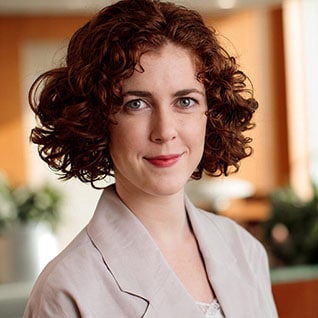/prod01/channel_2/media/mccms/content-assets/about/news/jan-april-2024/1024X512_Danielle-Beetler-Research-poster-symposium-WF3086759_0141.jpg)
January 22, 2024
"Phase Transitions" is a series in which students who are near the end of their Ph.D. training at Mayo Clinic Graduate School of Biomedical Sciences talk about their research journeys, lessons learned and hopes for the future.
 Danielle Beetler
Danielle Beetler
Hometown: Galesburg, Illinois
Graduate track: Clinical and Translational Science
Research mentor: DeLisa Fairweather, Ph.D., Mayo Clinic in Florida
What was the biomedical issue you addressed in your research, and what did your studies find?
Myocarditis is a cardiovascular disease that can develop quickly and severely, especially in otherwise fit and healthy young men. Patients' symptoms are due to an overexcited immune response to a viral infection, such as COVID-19, influenza, and other viruses. The body tries to get rid of the viral threat, but the immune response ends up damaging the heart, and patients are at risk of sudden death from acute heart failure. The immune response is escalated by cellular messages — molecular instructions that are released by cells to recruit and coordinate cells that fight infection. Under normal circumstances, the cellular messaging system is calm and under control. My research investigated whether adding healthy cellular messages to a mouse model of viral myocarditis can help control an immune response and prevent heart damage.
My project involved studying biogenic nanoparticles, including extracellular vesicles, which are tiny "envelopes" that are shed by cells and contain cellular messages. The study of extracellular vesicles is a field that's in its infancy but is exploding with potential.
My research found that the introduction of healthy extracellular vesicles was able to reduce inflammation in mice with viral myocarditis. Importantly, the approach also improved cardiac function. The studies are an important step in exploring a biocompatible, novel treatment for myocarditis and perhaps other cellular messaging-related diseases. Our first article has been published, and we have more to come.
What opportunities at Mayo helped you grow as a scientist and thinker?
I was able to use many pioneering techniques, including super-resolution microscopy that can provide 3D visualization down to tens of nanometers. In addition, Dr. Fairweather's lab has many collaborators. Mayo researchers and clinicians who are world leaders in their fields helped my research progress by sharing their expertise in regenerative medicine and clinical myocarditis.
I also gained valuable personal skills. During graduate school, I held several roles within the Graduate Student Association, including co-president of the student body. These roles were essential in the development of my leadership skills and in my approach to coordinating team efforts, all tools that will help me in my future roles in healthcare.
What's next?
I entered graduate school with the ultimate goal of becoming a physician-scientist who cares for patients' immediate needs and who researches unanswered questions regarding their conditions and care. My training in the Clinical and Translational Science graduate track gave me a broad appreciation for the many stakeholders involved in improving human health, including scientists at the bench, clinical care teams that run clinical trials, and public health researchers and clinicians who are involved in the logistics of translating innovations to everyday care. My next step will be to earn a medical degree so I can be actively involved in patient care.